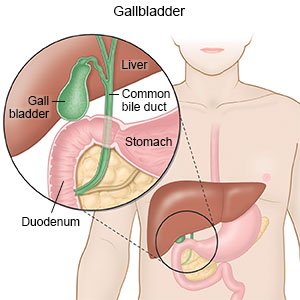Cholecystitis
Medically reviewed by Drugs.com. Last updated on Apr 6, 2025.
Cholecystitis is inflammation of your gallbladder. Your gallbladder stores bile, which helps break down the fat that you eat. Your gallbladder becomes inflamed if it is not able to release bile. You may have a sudden, severe symptoms (acute cholecystitis) or mild symptoms over a period of time (chronic cholecystitis).
 |
DISCHARGE INSTRUCTIONS:
Return to the emergency department if:
- You have severe pain in your abdomen.
- You cannot stop vomiting.
Call your doctor if:
- You have a fever or chills.
- Your skin or the whites of your eyes turn yellow.
- You have questions or concerns about your condition or care.
Drugs used to treat this and similar conditions
Actigall
Actigall is used for gallbladder disease, primary biliary cholangitis
Omvoh
Omvoh is used to treat moderate to severe ulcerative colitis or Crohn's disease in adults. This ...
Urso Forte
Urso Forte is used for gallbladder disease, primary biliary cholangitis
Reltone
Reltone is used for gallbladder disease, primary biliary cholangitis
Chenodiol
Chenodiol systemic is used for cerebrotendinous xanthomatosis, gallbladder disease
Treatment options
The following list of medications are related to or used in the treatment of this condition.
Medicines:
You may need any of the following:
- Antibiotics treat a bacterial infection.
- Prescription pain medicine may be given. Ask your healthcare provider how to take this medicine safely. Some prescription pain medicines contain acetaminophen. Do not take other medicines that contain acetaminophen without talking to your healthcare provider. Too much acetaminophen may cause liver damage. Prescription pain medicine may cause constipation. Ask your healthcare provider how to prevent or treat constipation.
- NSAIDs , such as ibuprofen, help decrease swelling, pain, and fever. This medicine is available with or without a doctor's order. NSAIDs can cause stomach bleeding or kidney problems in certain people. If you take blood thinner medicine, always ask your healthcare provider if NSAIDs are safe for you. Always read the medicine label and follow directions.
- Take your medicine as directed. Contact your healthcare provider if you think your medicine is not helping or if you have side effects. Tell your provider if you are allergic to any medicine. Keep a list of the medicines, vitamins, and herbs you take. Include the amounts, and when and why you take them. Bring the list or the pill bottles to follow-up visits. Carry your medicine list with you in case of an emergency.
Eat a variety of healthy foods:
This may decrease your symptoms. Healthy foods include fruit, vegetables, whole-grain breads, low-fat dairy products, beans, lean meat, and fish. Ask if you need to be on a special diet.
 |
Follow up with your doctor as directed:
Write down your questions so you remember to ask them during your visits.
© Copyright Merative 2025 Information is for End User's use only and may not be sold, redistributed or otherwise used for commercial purposes.
The above information is an educational aid only. It is not intended as medical advice for individual conditions or treatments. Talk to your doctor, nurse or pharmacist before following any medical regimen to see if it is safe and effective for you.
Learn more about Cholecystitis
Treatment options
- Medications for Acute Cholecystitis
- Medications for Cholecystitis
- Medications for Gallbladder Disease
Care guides
Symptoms and treatments
Further information
Always consult your healthcare provider to ensure the information displayed on this page applies to your personal circumstances.
